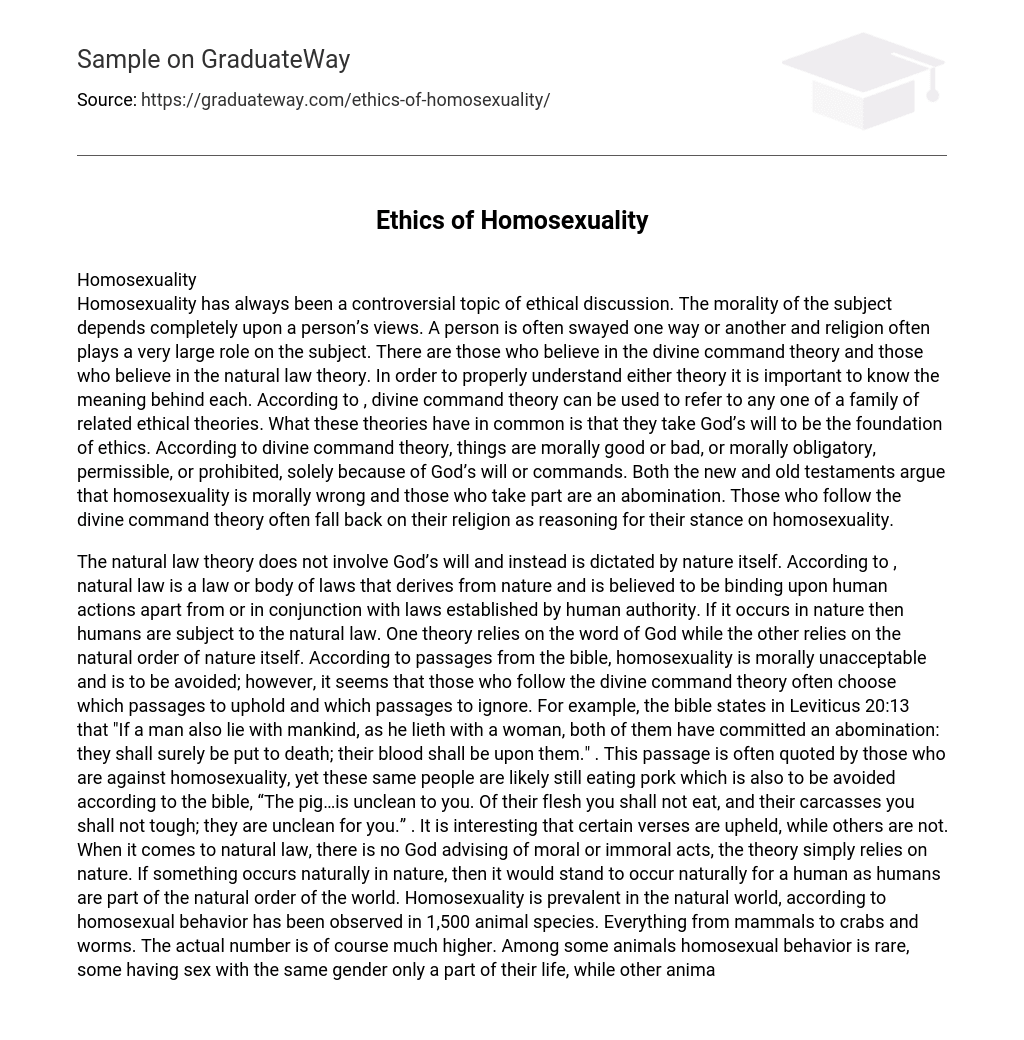Homosexuality
The topic of homosexuality has always been a source of controversy in ethical discussions, as its morality is subjective to individual perspectives. Religion often influences people’s opinions on homosexuality, with the divine command theory and natural law theory playing significant roles. It’s important to understand both theories for a proper understanding. The divine command theory encompasses a group of related ethical theories that regard God’s will as the foundation of ethics. According to this theory, things are deemed morally good or bad, obligatory, permissible, or prohibited solely based on God’s will or commands. Both the old and new testaments argue that homosexuality is morally wrong and individuals involved in it are considered abominations. Those who adhere to the divine command theory commonly use their religious beliefs as justification for their stance on homosexuality.
The theory of natural law is based on principles inherent in nature rather than God’s will. It encompasses laws originating from nature that apply to human behavior alongside human-made laws. Humans have an obligation to follow these laws when they exist within nature. There are two main theories: one based on divine command and the other on the inherent order in nature. According to biblical teachings, homosexuality is morally unacceptable, but proponents of divine command theory selectively adhere to certain passages while ignoring others. For example, Leviticus 20:13 labels homosexuality as an abomination punishable by death, yet these individuals may still consume pork despite it being condemned in the Bible as unclean. This selective adherence raises questions about which verses are upheld and which are ignored. In terms of natural law, there is no explicit guidance from God regarding moral or immoral acts; instead, this theory relies solely on principles derived from nature itself. If something occurs naturally in nature, it would occur naturally for humans because we are part of the natural order.Homosexuality is prevalent in the natural world, with approximately 1,500 animal species exhibiting this behavior. These species span across various groups like mammals, crabs, and worms. However, it is believed that this number could be higher than currently estimated. While some animals may only engage in homosexual behavior during certain stages of their lives or infrequently, others like dwarf chimpanzees consistently display homosexuality throughout their entire lifespan. Additionally, there are certain animals that exclusively form same-sex relationships. A noteworthy example is seen in birds such as geese and ducks, which establish lifelong partnerships; around four to five percent of these couples consist of individuals of the same gender.
It has been observed that single females will lay eggs in the nest of a homosexual pair, and these same-sex couples are often better at raising young than heterosexual couples. While religion is important for guiding individuals towards an ethical life, it is essential to recognize that not all verses from religious texts should be taken literally. John Corvino argues for considering cultural differences between biblical times and the present day when interpreting moral issues. It’s important to note that the Bible was written long after Christ’s death and before modern times, so assuming its direct applicability now could be incorrect. If someone chooses to live by God’s teachings, they should follow all verses rather than selectively picking those they find relevant. Natural law is not solely based on ancient scriptures but also takes into account current reality. Believing that something written in a different era has no relevance today would be inaccurate. Homosexuality occurs naturally in various species, including humans, which indicates its naturalness.
Works Cited
Corvino, J. (2012). Why Shouldn’t Tommy and Jim Have Sex? A Defense of Homosexuality. In R. Shafer-Landau, The Ethical Life (p. 247). New York, New York: Oxford University Press, Inc.
Hagler, F. (n.d.). What Does the Bible Say about Homosexuality? 12 Bible Verses About Gay Marriage. Retrieved October 10, 2013, from PolicyMic:





